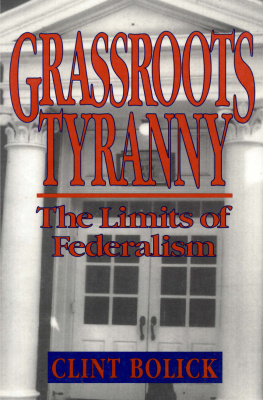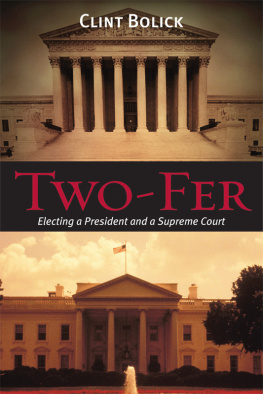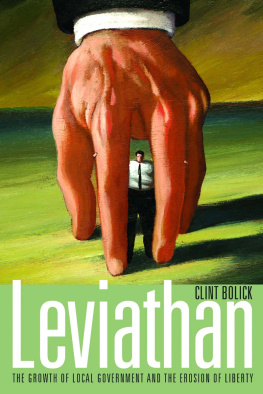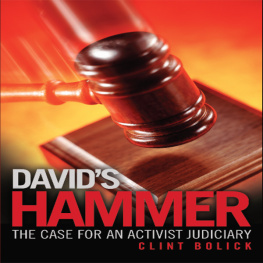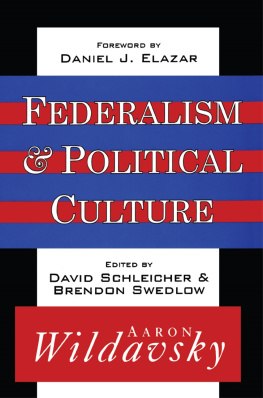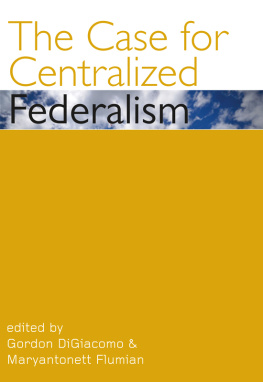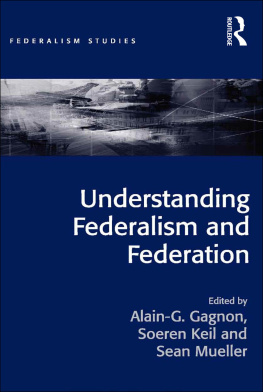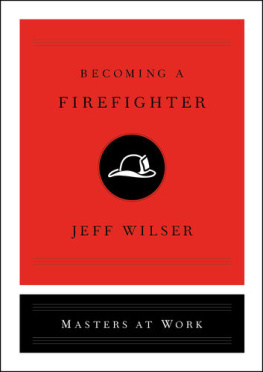GROSSROOTS
TYRANNY
GROSSROOTS
TYRANNY
The Limits of Federalism
Copyright 1993 by the Cato Institute.
All rights reserved.
Library of Congress Cataloging-in-Publication Data
Bolick, Clint.
Grassroots tyranny : the limits of federalism / Clint Bolick.
p. cm.
Includes bibliographical references and index.
ISBN 1-882577-01-9 (hardback) : $21.95.ISBN 1-882577-00-0 (pbk.) : $12.95
1. Civil rightsUnited States. 2. Federal governmentUnited States. 3. State governmentsUnited States. 4. Local governmentUnited States. I. Title.
JC599.U5B5575 1993 93-3957
323.4'9'O973dc2O CIP
Printed in the United States of America.
CATO INSTITUTE
1000 Massachusetts Ave., N.W.
Washington, D.C. 20001
For my son,
Todd Garrison Bolick,
a spirited individualist
Acknowledgments
This book is a hybrid, combining a philosophical and historical dissertation on federalism with real-world, journalistic-style accounts of grassroots tyranny. As a result, the research requirements were daunting, particularly for someone whose primary vocation is not writing but litigation.
I could not have produced this book without tremendous assistance and inspiration from Mary Chlopecki. Had she not agreed at a Baltimore Orioles game in the summer of 1988 to assist in the project, it never would have come to fruition. In addition to gathering data on grassroots tyranny from sources far and wide, Mary drafted significant portions of chapters 6 (property rights) and 7 (freedom of speech) and contributed to much of the rest. The book is enriched tremendously by her editing prowess, insights, and humor.
The book's other indispensable partner is the Cato Institute, and I am indebted especially to Ed Crane, David Boaz, and Roger Pilon. As anyone who knows them will agree, they are first-rate professionals and philosophical taskmasters, and I delight in my every collaboration with them. In addition to sponsoring, editing, publishing, and marketing this book, the Cato Institute has stood behind me throughout my career as a public interest lawyer, and I am enormously grateful for its support.
Numerous organizations and individuals contributed examples of grassroots tyranny, many of which appear in these chapters. Special thanks to Ira Glasser and the American Civil Liberties Union (ACLU); Arthur Eisenberg and the New York Civil Liberties Union; the ACLU of Northern California; the ACLU Foundation of Southern California; Timothy Bittle and the Pacific Legal Foundation; Brian Summers, Bettina Greaves, and the Foundation for Economic Education; Sam Kazman and the Competitive Enterprise Institute; Virginia Postrel and the Reason Foundation; David Keating and the National Taxpayers Union; Joe Bast and the Heartland Institute; Mark Bredemeier and Landmark Legal Foundation; Henry Butler, George Mason University School of Law; Jane Shaw and the Political Economy Research Center; Jonathan Emord of the Cato Institute; Dave Kehler and the Public Affairs Research Institute of New Jersey; Dan Lavey and Oregonians in Action; James Taranto; and Mary Lynn (Rasmussen) Chess, the "Okie Girl." I hope I haven't forgotten anyone! Additional technical support was supplied by Julie Chlopecki, who painstakingly cite-checked the manuscript.
Some of the individuals whose encounters with grassroots tyranny are described in this book are or were clients of mine: Taalib-din Abdul Uqdah and Pamela Ferrell, Alfredo Santos, Ego Brown, Stuart Marsh, and Stanley Dea. These people are heroes in the tradition of Rosa Parks, who refused to sit in the back of the bus. Their courage inspires me ceaselessly.
Sometimes the ordeals they faced have happy endings. As this book was going to press, Uqdah and Ferrels 10-year struggle to save their hairbraiding business (see chapter 9) finally succeeded: on December 15, 1992, the District of Columbia city council, faced with litigation by the Institute for Justice and extensive media attention, voted to deregulate the cosmetology profession. Those two entrepreneurs' triumph against grassroots tyranny marks an important milestone in the quest to restore economic liberty in America.
Last but not least, I thank my colleagues at the Institute for Justice, especially Chip Mellor and Scott Bullock, as well as our directors and supporters, not only for their enthusiasm for this book, but for providing the most congenial and stimulating base from which to wage the battle for liberty in the courts.
If anything, this book illustrates the enormity of the task ahead. Ordinarily, at this point I'd quote something inspirational from my hero, Tom Paine. Instead I'll quote the modern sage Yogi Berra, who aptly stated, "It ain't over 'til it's over." To my aforementioned friends, I say, The road ahead may prove treacherous, but there's no one I'd rather travel it with than you.
Introduction
For most people, federalism is an abstraction, one of those murky concepts that crops up in high school civics or college political science classes. At best, federalism is vaguely understood as a notion that was important during the American founding era, having something to do with a preference for local over national government because of its proximity to the people. Given the modern growth and power of national government, most people would likely consider federalism a quaint anachronism.
That is true even though federalism issues are at the core of many contemporary legal battles that touch upon matters of great importance to individuals, ranging from abortion to taxation, economic regulation, freedom of speech, and private-property rights. Unfortunately, those charged with the responsibility of applying the principles of federalism in such cases seem not to understand them any better than the typical person on the street. This confusion about federalism and its proper role in our constitutional system has produced effects that are extremely deleterious to individual liberty. The most serious of those effects is the phenomenon of grassroots tyranny, the abuse of individual rights by local governments.
I first encountered grassroots tyranny long before I knew anything about federalism. Although I did not fully appreciate the significance of this experience at the time, it left a vivid impression on me.
This initial encounter occurred when I was growing up in the suburban city of Linden, New Jersey. By ninth grade, I had developed a lively interest in politics and decided to involve myself at the local level. I discovered that Linden's politics were completely dominated by the city's autocratic mayor, John T. Gregorio. Indulging a tendency that has recurred fairly constantly since then, I aligned myself with the underdogin this instance, a retired insurance executive named Joe Locascio, Mayor Gregorio's nemesis and the only Republican on the 11-member city council. Locascio took me under his wing, teaching me that principle is more important than expediency, and delighting me with such witticisms as "When you vote for the elephant or the donkey, that's what you get," and (in an allusion to the famous "silent majority" slogan of the Nixon era) "The majority is not silent, the government is deaf!"
Generally, Joe Locascio was to the mayor little more than a nuisance. But over time, his persistence paid off. Forcing a ballot initiative, he took away the mayor's most prized possessionhis power to appoint the board of education and thereby to control an enormous reservoir of patronage and influence. The advent of an elected school board was Joe Locascio's greatest triumph and John Gregorio's most humiliating defeat.


